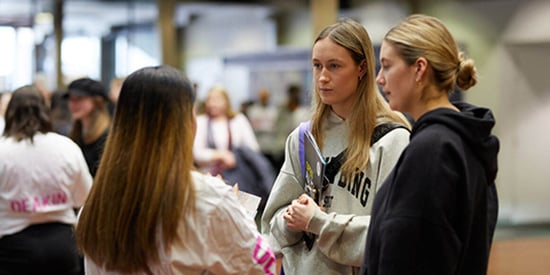Key facts
Duration
2 years full-time
Locations
Current Deakin Students
To access your official course details for the year you started your degree, please visit the handbook
Course overview
More than 43% of Australians aged 16 to 85 have experienced a mental health challenge throughout their life*. With growing demand for counselling services, our Master of Counselling will help you build the advanced analytical and communication skills needed to support individuals, couples, and groups through mild to moderate mental health and developmental challenges.
Want to take the next step in your career and help people improve their mental wellbeing?
Whether you are from a counselling background or a related field like teaching, healthcare, or social work, the Master of Counselling will equip you with the skills to connect with and compassionately support your clients. You will graduate with 200 hours of practical experience, preparing you to provide personalised support to clients tailored to their unique circumstances. Through practical learning opportunities, you will learn how to apply complex counselling theories to identify and address emotional issues, using cognitive behaviour therapy, emotion-focused therapy, and other talking therapies.
Your learning will be shaped by our School of Psychology’s cutting-edge research, rated as well-above world standard^. You will critically explore contemporary research in the field, as well as a diverse range of specialist counselling topics including trauma, grief, sex and sexuality, relationship counselling, and group counselling. In addition to working with clients face-to-face, you will learn how to provide support via video call, telephone, and through other digital communication tools, which are each becoming increasingly important in modern counselling practice.
As a Master of Counselling graduate, you will demonstrate specialist knowledge of counselling roles, as well a practical understanding of skills, theory, interventions, and ethics across the lifespan to a variety of audiences. This includes:
- counselling micro-skills
- mental health issues
- professional practice issues
- human development
- counselling diverse populations
- counselling therapies
- ethics.
Complement your theoretical learning with 200 hours of valuable placement experience#, where you will engage with clients of diverse backgrounds and age groups. Enabling you to further enhance your skills in building rapport with clients and providing personalised support through assessment and intervention strategies. Your placement hours will include autonomous direct client contact, non-contact activities, supervised training, as well as collaboration with other mental health professionals, preparing you to work in supervisory, leadership, and managerial roles.
Want to boost your career opportunities in shorter time? We offer a Graduate Certificate of Counselling and Graduate Diploma of Counselling, which are perfect for those wanting to upskill in a shorter timeframe.
* Australian Bureau of Statistics National Study of Mental Health and Wellbeing, 2020-21
^ Excellence in Research Australia, 2015-2018
# All placement hours must be completed with the placement host and students physically located in Australia.
Course information
- Award granted
- Master of Counselling
- Year
2024 course information
- Deakin code
- H758
- CRICOS code?
- 112781A Burwood (Melbourne)
- Level
- Higher Degree Coursework (Masters and Doctorates)
- Australian Qualifications Framework (AQF) recognition
The award conferred upon completion is recognised in the Australian Qualifications Framework at Level 9
Course structure
To complete the Master of Counselling students must attain 16 credit points. All units are core (these are compulsory).
You must complete two essential units that have been designed to prepare you with the knowledge and skills to begin placement (HPY730 Principles of Counselling and Telehealth and HPY734 Ethical and Legal Issues in Counselling), before undertaking HPY737 Counselling Placement 1. Although, you could begin sourcing a placement earlier. Note: all placement hours must be completed with the placement host and students physically located in Australia.
Students should enrol in the Trimester 2 offering of HPY733 Lifespan and Developmental Counselling and HPY736 Contemporary Counselling Therapies.
All commencing Faculty of Health Undergraduate and Postgraduate course work students are required to complete DAI001 Academic Integrity Module (0 credit point compulsory unit) in their first trimester of study.
Students are required to meet the University's academic progress and conduct requirements.
Year 1 - Trimester 1
Year 1 - Trimester 2
Year 2 - Trimester 1
Year 2 - Trimester 2
* All placement hours must be completed with the placement host and students physically located in Australia.
Intakes by location
The availability of a course varies across locations and intakes. This means that a course offered in Trimester 1 may not be offered in the same location for Trimester 2 or 3. Check each intake for up-to-date information on when and where you can commence your studies.
Trimester 1 - March
- Start date: March
- Available at:
- Burwood (Melbourne)
This course has limited places available, applicants are strongly encouraged to submit an application as soon as possible.
Trimester 2 - July
- Start date: July
- Available at:
- Burwood (Melbourne)
This course has limited places available, applicants are strongly encouraged to submit an application as soon as possible.
Additional course information
The Master of Counselling course contains topics that could be triggering or distressing for some individuals. If you have unresolved trauma or grief, we strongly recommend that you carefully consider whether you are ready to engage with this course at this time. It is important to prioritise your mental health and wellbeing, and seeking support from a mental health professional may be a helpful option. Please be aware that support is available to you throughout your studies, and we encourage you to reach out to the services provided by Wellbeing at Deakin if you need to do so.
Mandatory student checks
In order to undertake placement, students will be required to attain a police check and a Working with Children Check, or equivalent based on their State of residence.
Students undertaking placement in any environment may be required to work with children, or incidentally exposed to children due to the nature of the counselling profession. Hence, the University has an obligation to ensure that students are suitable for placement and the children they work with are safe.
To gain professional accreditation with the Australian Counselling Association and the Psychotherapy and Counselling Federation of Australia, students are required to disclose and explain any professional misconduct, formal complaints made against them as a counsellor, serious criminal offences, current investigations, or refusal of application to work with children.
Workload
As a student in the Faculty of Health you can expect to participate in a range of teaching activities each week. This could include lectures, seminars, practicals, placements and online interaction. You can refer to the individual unit details in the course structure for more information. You will also need to study and complete assessment tasks in your own time. Teaching, placements and assessment tasks may take place outside of Deakin University teaching periods.
On-campus attendance requirements
To meet industry accreditation requirements, students must participate in a compulsory on-campus intensive (of either two- or three-days duration) for certain units. Please note that some units are entirely online, whilst others have a blended delivery of online and one face-to-face on-campus intensive. Please refer to the individual unit details in the online handbook for more information about how each unit is delivered. There are no weekly on-campus attendance requirements in any unit.
Participation requirements
Students will be required to complete 200 hours of placement, composed of client contact, supervision and non-contact counselling related activities. All placement hours must be completed with the placement host and students physically located in Australia.
Placement is an essential component of the course, required by both accrediting associations, the Australian Counselling Association and the Psychotherapy and Counselling Federation of Australia. When students complete the course, they may be asked to submit evidence of their placement with a detailed log book of hours attained.
Entry requirements
Selection is based on a holistic consideration of your academic merit, work experience, likelihood of success, availability of places, participation requirements, regulatory requirements, and individual circumstances. You will need to meet the minimum academic and English language proficiency requirements to be considered for selection, but this does not guarantee admission.
Please note, there are limited places in this course and entry is competitive. Applicants are strongly encouraged to submit an application as soon as possible. Applications for this course may close prior to the published closing date if all places are filled.
Academic requirements
To be considered for admission to this degree you will need to meet at least one of the following criteria:
- completion of a bachelor degree or higher in any discipline
- evidence of academic capability judged to be equivalent and a recorded person statement (video)
English language proficiency requirements
To meet the English language proficiency requirements of this course, you will need to demonstrate at least one of the following:
- bachelor degree from a recognised English-speaking country
- IELTS overall score of 7.0 (with no band score less than 6.5) or equivalent
- other evidence of English language proficiency (learn more about other ways to satisfy the requirements)
Non-academic requirements
You will also be required to submit a recorded video (personal statement) where you will respond to two questions to assess your suitability. You may be asked to attend an interview if more information is required.
Preference may be given to applicants with an equivalent credit average (65%) or above.
Admissions information
Learn more about Deakin courses and how we compare to other universities when it comes to the quality of our teaching and learning.
Not sure if you can get into Deakin postgraduate study? Postgraduate study doesn’t have to be a balancing act; we provide flexible course entry and exit options based on your desired career outcomes and the time you are able to commit to your study.
Recognition of prior learning
The University aims to provide students with as much credit as possible for approved prior study or informal learning which exceeds the normal entrance requirements for the course and is within the constraints of the course regulations. Students are required to complete a minimum of one-third of the course at Deakin University, or four credit points, whichever is the greater. In the case of certificates, including graduate certificates, a minimum of two credit points within the course must be completed at Deakin.
Fees and scholarships
Fee information
Learn more about fees and your options for paying.
Fees and charges vary depending on your course, your fee category and the year you started. To find out about the fees and charges that apply to you, visit www.deakin.edu.au/fees.
Scholarship options
A Deakin scholarship might change your life. If you've got something special to offer Deakin – or you just need the financial help to get you here – we may have a scholarship opportunity for you.
Postgraduate bursary
If you’re a Deakin alumnus commencing a postgraduate award course, you may be eligible to receive a 10% reduction per unit on your enrolment fees.
Apply now
Applications can be made directly to the University through StudyLink Connect - Deakin University's International Student Application Service. For information on the application process and closing dates, see the How to apply web page.
Fill out the application form and submit to a Deakin International office or take your application form to a Deakin representative for assistance
Please refer to the additional applicant instructions PDF for information regarding inherent requirements for the course including video upload.
For information on the application process and closing dates, see the How to apply webpage.
If you’re still having problems, please contact Deakin International for assistance.
Entry pathways
Alternative exits
- Graduate Certificate of Counselling (H558)
- Graduate Diploma of Counselling (H658)
Careers
Career outcomes
There is strong demand for counsellors in Australia, with 14.2% projected employment growth by November 2026**. Counsellors work across a broad range of roles related to mental health, disability, allied health, and social support services. Some roles may include:
- youth work and school counselling
- mental health support
- career and professional guidance
- telephone/online counselling services
- trauma counselling
- drug and alcohol counselling
- grief support
- relationship and family counselling
- sex and sexuality support services.
Our Master of Counselling is accredited with the Australian Counselling Association (ACA) Australia's leading single registration body for Counsellors and Psychotherapists.
You may choose to become a student member of ACA whilst you study. Upon graduation you will be eligible to apply as a Registered Counsellor level 2 member with ACA, boosting your employment opportunities, establishing valuable networks and expanding your professional development opportunities.
**2021 Employment Outlook – for the five years to November 2026, Australian Government, Jobs and Skills Australia.
Professional recognition
The Master of Counselling is accredited by the Australian Counselling Association (ACA) and the Psychotherapy and Counselling Federation of Australia (PACFA).
This qualification has been assessed as being an equivalent qualification for the purposes of the Mandatory Minimum Qualifications policy for employment in specialist family violence practitioner roles in Victoria.
Course learning outcomes
Deakin's graduate learning outcomes describe the knowledge and capabilities graduates can demonstrate at the completion of their course. These outcomes mean that regardless of the Deakin course you undertake, you can rest assured your degree will teach you the skills and professional attributes that employers value. They'll set you up to learn and work effectively in the future.
| Graduate Learning Outcomes | Course Learning Outcomes |
| Discipline-specific knowledge and capabilities | Demonstrate specialist knowledge of counselling roles, and knowledge and application of skills, theory, interventions, and ethics across the lifespan to a variety of audiences relevant to professional counselling. |
| Communication | Employ clear written and oral communication skills to effect therapeutic change among diverse client groups. Convey complex counselling theories and ideas to a variety of audiences, including clients, colleagues, and other professionals. |
| Digital literacy | Use a range of digital tools to locate and disseminate counselling information and client resources. Awareness and use of digital tools to provide counselling. |
| Critical thinking | Identify, synthesize, integrate, and critically reflect on research to inform counselling practice. |
| Problem solving | Appraise, select, and apply specialised counselling skills and knowledge to understand and work with. Initiate, plan, and implement tailored counselling interventions that address client issues. |
| Self-management | Demonstrate high-level self-management and awareness in learning and practice that reinforces the importance of responsibility, accountability, and ethics in professional counselling. |
| Teamwork | Work effectively in supervisory, leadership, and managerial capacities with diverse ethnic and cultural partners and teams to promote professional competence and growth. Communicate and collaborate with other mental health professionals to support clients. |
| Global citizenship | Evaluate and apply ethical principles to work productively in the field of counselling within diverse social, cultural and environmental contexts. Collaborate and communicate in a self-reflective and culturally sensitive manner. |




